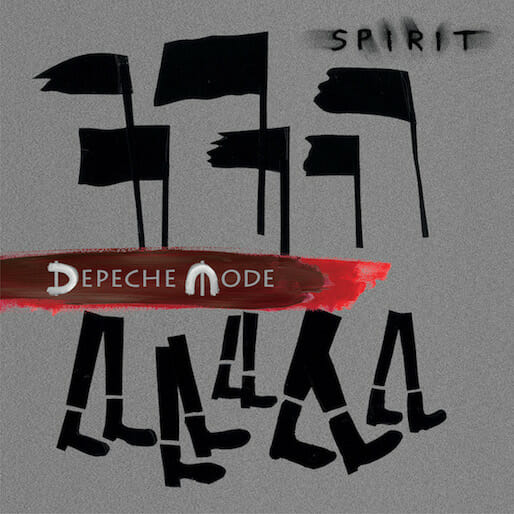Introducing Endless Mode: A New Games & Anime Site from Paste
Part of what makes for a great late-period album for an elder alternative band like Depeche Mode is a degree of resignation. Originality remains important but forced innovation sort of comes across like the musical equivalent of a fifty-something wearing tight leather pants.
Take Brian Eno, Wire or David Bowie’s last couple records: all of them are less about risk and more about confidence. They knew what they were good at, they ditched all the costuming—in Bowie’s case, both literally and figuratively—and they focused on realism rather than relevancy. The realism here being: we’re all older, we’re all mortal, our most influential work is behind us but why the hell not keep writing songs?
This was a quality recent Depeche Mode albums had too. A listen to “Precious” or “John the Revelator” off Playing the Angel reveals the band could still make modest yet impressive music. They were tightly crafted songs, shaped by years of writing others like them. Rather than go for anthems, they went for a more hushed, wise and simplified sound and it paid off. What was there to prove? They were Depeche Mode.
Spirit, on the other hand, is a statement that didn’t need to be made, the proof that this band still “matters” even though their fans still thought they already did. It’s all rehashed ambition without any of the wisdom of their years. Spirit would be impressive if it were pastiche, a fan trying to write in the style of Depeche Mode. Given it comes from the source though, it sounds like Martin Gore trying to rewrite Violator, a new record familiar only because it’s derivative of a more noteworthy predecessor.
Instrumentation aside, the lyricism suffers from heavy handed political pen strokes the Trump/Brexit era is bound to produce in a lot of bands. The lead single from this record was “Where’s the Revolution?” and the answer is decidedly: not here. It doesn’t even take getting to that track—it’s only the second—to start cringing at the juvenile, stick-it-to-the-man buzz speak. Dave Gahan’s voice is more cabaret than commanding as he spells out all the ways the world is going wrong on opening track “Going Backwards”: “We’re going backwards / Ignoring the realities / Going backwards / Are you counting all the casualties?”
It’s hard to picture those lines delivered without an undeservedly proud smirk. The fact they’re accompanied by such a grandiose chord progression and atmospheric buildup makes it even more uncomfortable. It feels more like a Muse album than the work of the band behind “Policy of Truth” or “Never Let Me Down Again.” There’s a try-hard theatricality robbing any political pronouncements of their ability to be taken seriously.
That’s not counting the irony of a band whose sold 100 million records writing a song called “Poorman” (“Corporations get the breaks / Keeping almost everything they make / And tell us just how long it’s going to take / For it to trickle down?”) sung by a man whose net worth is $45 million.
The worst of it is Gore can write decent protest songs wherein the band’s surging income doesn’t become a glaringly hypocritical reality. He has in the past—“Everything Counts,” “People Are People”—and he even does here. “The Worst Crime” is a slowed-down ballad that the whole record should’ve sounded like. Instead of trying to write overcooked anthems for giant crowds to sing, the more understated and reined-in instrumentation and lyrics evidenced here would’ve made for a much a better record overall.
Gore’s strength as a songwriter has always been his near perfect command of the melancholy without descending into the obnoxiously maudlin. He’s better writing about personal, spiritual struggles than external, political ones and he always has been. “No More (This is the Last Time)” would be a classic example of his best talents on display. Except that one was written by Dave Gahan and Kurt Uenela anyway. It might be time for synthpop’s greatest bard to take a minute to remember what made him so great in the first place.
Spirit is Make Depeche Mode Great Again when they were still pretty great anyway. Instead it’s an occasionally comical throwback to when they were at their biggest, with a few good-not-great moments. One can only hope they chill out and come up with something better in a few years.
